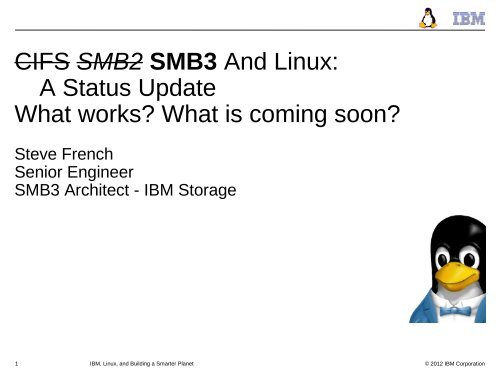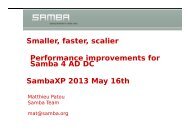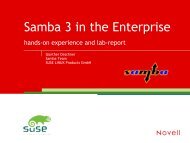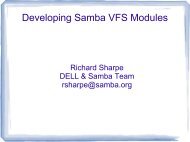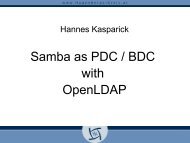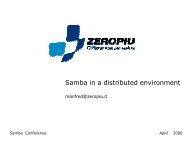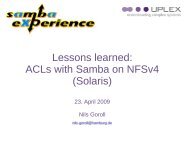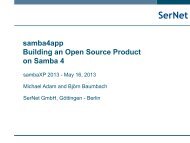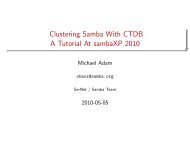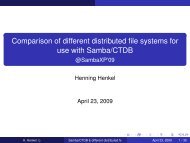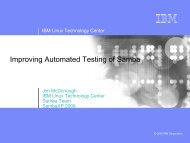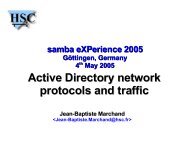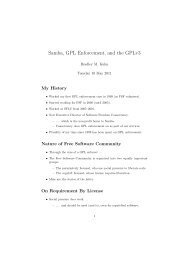Steven French PDF - sambaXP
Steven French PDF - sambaXP
Steven French PDF - sambaXP
Create successful ePaper yourself
Turn your PDF publications into a flip-book with our unique Google optimized e-Paper software.
CIFS SMB2 SMB3 And Linux:<br />
A Status Update<br />
What works What is coming soon<br />
Steve <strong>French</strong><br />
Senior Engineer<br />
SMB3 Architect - IBM Storage<br />
1 IBM, Linux, and Building a Smarter Planet<br />
© 2012 IBM Corporation
Legal Statement<br />
– This work represents the views of the author(s) and does not<br />
necessarily reflect the views of IBM Corporation<br />
– A full list of U.S. trademarks owned by IBM may be found at<br />
http://www.ibm.com/legal/copytrade.shtml.<br />
– Linux is a registered trademark of Linus Torvalds.<br />
– Other company, product, and service names may be<br />
trademarks or service marks of others.<br />
2<br />
© 2012 IBM Corporation
Who am I<br />
– Steve <strong>French</strong> (smfrench@gmail.com or<br />
sfrench@us.ibm.com)<br />
– Author and maintainer of Linux cifs vfs (for<br />
accessing Samba, Windows and various<br />
SMB/CIFS based NAS appliances)<br />
– Wrote initial SMB2 kernel client prototype<br />
– Member of the Samba team, coauthor of<br />
SNIA CIFS Technical Reference and former<br />
SNIA CIFS Working Group chair<br />
– SMB3 Architect: IBM Storage<br />
05/31/11<br />
© 2012 IBM Corporation
Why SMB 3 – what does protocol improve on<br />
Addresses requirements of 4 key enterprise workloads and Improves<br />
– Availability<br />
• Enable transparent client recover in the presence of Network Failure<br />
• Server Failure<br />
• Minimize failover time to reduce application stalls<br />
• Also allow planned, application initiated failover<br />
– Performance<br />
• Enable clients to aggregate available bandwidth across adapters transparently<br />
• Continue to increase efficiency on high bandwidth networks<br />
• Cluster enabled to allow for higher scalability<br />
– Traffic Reduction<br />
• Continue improving user perceived latency when working in a WAN environment<br />
Key features:<br />
– Multichannel<br />
– SMB over RDMA<br />
– Scale-Out Awareness<br />
– Per-share encryption (and security even better in other areas too ...)<br />
– Persistent Handles<br />
– Witness Notification Protocol<br />
– Clustered Client Failover<br />
– Directory Leasing and improved metadata caching<br />
– Branch Cache v2 (content addressable storage)<br />
– Support for Storage Features (TRIM, block size discovery, T10 etc)<br />
– Claims Based Access Control<br />
© 2012 IBM Corporation
Why SMB 3<br />
SMB 3 will be critical to Linux, and important to our customers<br />
– Goes beyond traditional CIFS/SMB2 strengths (already the most popular file protocol)<br />
and addresses key enterprise workload requirements for virtualization, HPC,<br />
Database and Web<br />
– Adds significant performance and functional improvements. In many cases SMB 3<br />
will be as fast as raw access to network block devices<br />
Key SMB 3 features play well to Linux/Samba strengths on high end hardware<br />
– Cluster friendly (cross-cluster shares, failover “witness protocol”, better HA features ...)<br />
– Larger i/o sizes<br />
– More parallel access, clients are more scalable<br />
– Metadata caching<br />
– Optional RDMA, and T10 enablement<br />
© 2012 IBM Corporation
What are our goals ...<br />
• Local/Remote Transparency<br />
– Most applications shouldn't notice or care if on remote mount vs. ext4<br />
• Near perfect POSIX semantics to Samba servers (and those which<br />
implement POSIX extensions) and best effort semantics to Windows and<br />
other NAS filers<br />
• Fast, efficient, full function, secure method for accessing (from Linux) data<br />
which lives on Windows servers or other NAS<br />
• As reliable as reasonably possible over bad networks<br />
• Be able to read and set not just file data but also all reasonably important<br />
Windows metadata (for backup, archive, gateways and to help server<br />
migration)<br />
6<br />
© 2012 IBM Corporation
What are our [SMB3] goals ...<br />
• Focus on SMB2.1 and SMB3 (SMB2.02 works, but lower priority)<br />
– Prototype and merge newer extensions faster (now that basic<br />
SMB2.1/SMB3 support in, and cifs.ko is MUCH more easily extensible)<br />
• SMB3 faster than CIFS (leverage RDMA, multicredit, multichannel, leasing)<br />
– SMB3 remote file access near local file access speed (when RDMA)<br />
• Lot of work to do here (SMB2.1 leasing works though)<br />
• Improve Samba server through cooperative testing<br />
• Continue to cleanup many of the small design and code problems noticed<br />
after coding cifs (good progress here)<br />
• Allow Higher Data Integrity guarantees, especially through use of durable<br />
and persistent handles (handle server failure without data loss)<br />
– Work about to begin here<br />
• Set better security settings than would be possible with cifs (which supports<br />
many older, buggy servers), and take advantage of better signing and pershare<br />
encryption<br />
– (SMB2.1 signing works, finish up SMB3 signing (getting close)<br />
• Testbed for SMB3 Unix Extensions<br />
7<br />
• Set better, simpler default mount options than cifs<br />
© 2012 IBM Corporation
Development on Linux kernel clients and Samba is very active<br />
• Kernel client (cifs.ko)<br />
– SMB2.1 support is in!<br />
– Current version is 2.0 (last year 1.78). Is visible via modinfo<br />
• In one year we have gone from kernel 3.4-rc6 to 3.9<br />
– 315 kernel changesets for cifs since 3.4-rc6, a very active year<br />
– More than 20 developers contributed<br />
– cifs continues to be one of the more active file systems<br />
– Development expected to grow more when SMB3 support improved,<br />
SMB2.1/SMB3 broadly matches cifs performance (which is quite good)<br />
and Unix Extensions for SMB2/SMB3 added<br />
8<br />
© 2012 IBM Corporation
Kernel (including the cifs client) improving rapidly<br />
• A year ago we had (3.4-rc6) “Saber-toothed<br />
Squirrel” (Cronopio dentiacutus)<br />
– http://news.nationalgeographic.com/ne<br />
ws/2011/10/101102-saber-toothedsquirrel-fossils-paleontology-dinosaursscience/<br />
• Now we have 3.9 “Unicycling Gorilla”<br />
9<br />
© 2012 IBM Corporation
Two Key Features we are working on (actually this week)<br />
• Full Linux xattr support<br />
– Empty xattr (name but no value)<br />
– Case sensitive xattr values<br />
– Security (SELinux) namespace (and others)<br />
• Copy offload (reflink, offload to server copy range)<br />
– New syscall coming, but cp already works with ioctl (to btrfs, ocfs2)<br />
– Samba support is in (thanks David)<br />
10<br />
© 2012 IBM Corporation
Linux Kernel Client improvements since last SambaXP<br />
• Performance improvements<br />
– Faster vectored AIO (3.4) and<br />
forcedirectio faster (3.4 and 3.5)<br />
– Readahead to Samba faster (3.4)<br />
– Maximum number of requests to a<br />
server increased: 256 to 32K (3.4)<br />
• Most servers default to 50<br />
simultaneous requests. requires<br />
update to smb.conf (Samba) or<br />
Windows server registry<br />
– SMB2.1 leases (caching) added<br />
– Added mount option Cache=<br />
• CIFS is VERY fast now on Linux to Linux<br />
(not just to Windows)<br />
– Great way to transfer large files<br />
– Not just the client has improved,<br />
Samba server performance also<br />
faster now due to improved dispatch<br />
of reads and writes as well<br />
• Other Improvements<br />
– SMB2.1 support added!<br />
• (followed by SMB2.02 and<br />
minimal SMB3 support)<br />
– “strictcache” mount option<br />
– Cifs.ko smaller footprint<br />
• Security improvements<br />
– Ntlmv2 auth default (not NTLM)<br />
– Smb2.1 signing (better than cifs<br />
signing) implemented<br />
– Dfs security negotiation fixes<br />
© 2012 IBM Corporation
Improvements by release<br />
• 3.4 58 changes, cifs version 1.78<br />
– handle “sloppy” mount option<br />
– Faster readahead don't cap ra_pages at the same level as default_backing_dev_info<br />
– Respect negotiated MaxMpxCount (and allows more reqs in flight, if server supports)<br />
• 3.5 42 changes, cifs version 1.78<br />
– add a deprecation warning to CIFS_IOC_CHECKUMOUNT ioctl<br />
– remove legacy MultiuserMount option<br />
– Add “cache=” option and display in /proc/mounts<br />
– add deprecation warnings to strictcache and forcedirectio mount options<br />
• 3.6 64 changes, cifs version 1.78<br />
– atomic open improvement added to VFS (and cifs)<br />
• 3.7 97 changes, cifs version 2.0<br />
– SMB2 added: support for smb2.1 dialect added!<br />
– remove support for deprecated "forcedirectio" and "strictcache" mount options<br />
– remove support for CIFS_IOC_CHECKUMOUNT ioctl<br />
© 2012 IBM Corporation
Improvements by release (continued)<br />
• 3.8 60 changes, cifs version 2.0<br />
– ntlmv2 auth becomes default auth (actually ntlmv2 encapsulated in NTLMSSP)<br />
– smb2.02 dialect support added and smb3 negotiation fixed<br />
– don't override the uid/gid in getattr when cifsacl is enabled<br />
• 3.9 38 changes, cifs version 2.0<br />
– dfs security negotiation bug fixes (krb5 security)<br />
• 3.10pre 13 changes, cifs version 2.1<br />
– cifs module size reduced<br />
– Smb3 signing fixed (planned) (Shirish)<br />
• 3.11 (planned)<br />
– Copychunk (refcopy ioctl, and syscall support) (Steve)<br />
– Full POSIX xattr support for cifs unix extensions (Steve and JRA)<br />
– Quota support (Satchin)<br />
– Auth and security settings config overhaul (Jeff and/or Steve)<br />
– Larger i/o sizes (including multicredit), compound ops (could be 3.12)<br />
• 3.12 or 3.13 (tentative)<br />
– Persistent and durable handle support (Pavel)<br />
© 2012 IBM Corporation
cifs read continues to get faster<br />
• cifs_iovec_read now collects/issues (larger) asynchronous reads. Primarily of use when a<br />
share is mounted with forcedirectio, or strictcache and the client doesn't have an oplock for<br />
the file being (in 3.5. From Jeff Layton)<br />
• Big increase read performance there<br />
• Test results from my low end KVM test rig to samba. Running simply:<br />
– $ dd if=./ddtest.out of=/dev/null bs=1M<br />
• Results:<br />
– Unpatched 3.4-rc2 kernel -- rsize is always capped at 16k here:<br />
• 1073741824 bytes (1.1 GB) copied, 97.6394 s, 11.0 MB/s<br />
– Patched 3.4-rc2 kernel – rsize=1M:<br />
• 1073741824 bytes (1.1 GB) copied, 9.89869 s, 108 MB/s<br />
– Patched 3.4-rc2 – rsize=61440:<br />
• 1073741824 bytes (1.1 GB) copied, 13.4146 s, 80.0 MB/s<br />
© 2012 IBM Corporation
Continuing perf improvements from early 2012 (thank you Jeff Layton)<br />
• Normal buffered large file read got MUCH faster on 3.2<br />
– 1GB file copy from server to /dev/null with dd (on slow kvm test system, would be<br />
more dramatic improvement over fast network to fast server)<br />
– prepatch, with 16k rsize:<br />
• 1073741824 bytes (1.1 GB) copied, 47.2119 s, 22.7 MB/s<br />
– postpatch, with 1M rsize:<br />
• 1073741824 bytes (1.1 GB) copied, 11.1602 s, 96.2 MB/s<br />
– postpatch, with 60k rsize:<br />
• 1073741824 bytes (1.1 GB) copied, 12.5183 s, 85.8 MB/s<br />
• Readahead had been often limited to 128K due to kernel bdi defaults – but when mounted<br />
to Samba which supports MUCH larger reads this limits perf gain of readahead<br />
– Patch to improve this in 3.4 kernel (slow kvm guest mount to local Samba on host –<br />
see below)<br />
– $ dd if=./ddtest.out of=/dev/null bs=1M count=1024<br />
– Prepatch:<br />
• 1048576000 bytes (1.0 GB) copied, 28.1979 s, 37.2 MB/s<br />
– Postpatch:<br />
• 1048576000 bytes (1.0 GB) copied, 11.92 s, 88.0 MB/s<br />
© 2012 IBM Corporation
But we have work to do: today SMB2.1 is faster than cifs (for kernel<br />
client) in only a few cases (so far)<br />
• Generally SMB2 performance would benefits from three factors<br />
– Larger i/o sizes<br />
– credit based flow control (easier to achieve more parallelism)<br />
– Improved caching model<br />
• But for kernel client today, the only key performance benefit is SMB2.1 leases<br />
– Cifs currently using larger i/o sizes (especially to Samba)<br />
– Cifs using fewer requests in some common code paths<br />
• Cifs is faster for stat (queryinfo), usually one path based request instead of 3 ie<br />
open/query/close (need to add compounding support to kernel client for smb2.1)<br />
• This is likely to improve a lot in 3.11 and on kernels<br />
© 2012 IBM Corporation
SMB2/SMB3 Kernel Client Status (Great work by Pavel fixing up<br />
SMB2/SMB2.1)<br />
• Can negotiate all three dialects (test focus is on SMB2.1)<br />
• SMB2.1 mounts work but still experimental<br />
– Basic file/directory operations work<br />
– Passes most functional tests (not quite as good as cifs to Windows)<br />
– Slower than cifs to Samba (no Unix Extensions, and using smaller i/o) but should<br />
improve a lot with multicredit and compounding<br />
• Little missing pieces (cifsacl) and some corner case (e.g. rename and delete of open files)<br />
need more testing<br />
• No Unix Extensions defined yet<br />
• SMB3 implementation very minimal<br />
– Smb3 signing needs to be added ASAP<br />
• Need to take advantage of various optional features when server supports<br />
– Cluster enablement<br />
– Directory Leases<br />
– Per-share encryption<br />
– Durable/Persistent handles, Witness protocol (reliability)<br />
• Even if server support, persistent handles probably need to be mount option too<br />
© 2012 IBM Corporation
SMB2/SMB3 Kernel Client Plans<br />
• SMB2.1 no longer considered “experimental” by 3.11 or 3.12<br />
– Bugfixes and more testing<br />
– Test feedback welcome<br />
• (SMB2.1 and) SMB3 expected to pass similar set of functional tests (to what cifs can do to<br />
Windows) by summer MS test event<br />
– Rename and delete of open files, acl support, symlinks need to be updated<br />
• Current plan is only focus on 2.1 and SMB 3, even if SMB2.02 works<br />
• Fewer mount options than cifs (simpler), and more strict defaults<br />
• To move from cifs to smb3 protocol as default we need:<br />
– SMB3 faster and more reliable than cifs to Windows (and non-Samba NAS)<br />
– SMB3 Unix Extensions defined, implemented in Samba and client<br />
– The latter will take longer. Not clear if we could (or should) pick different default to<br />
Samba and Windows.<br />
© 2012 IBM Corporation
What about NFS ...<br />
© 2012 IBM Corporation
Not For Windows Only: “SMB3 Unix Extensions”<br />
• Now that we know more, what do we need from SMB3 Unix Extensions<br />
– Posix pathnames<br />
– Posix delete (unlink) behavior<br />
– Posix create/mkdir (small additional create/open context)<br />
– Minor extensions for stat and statfs<br />
• Not clear whether usual workarounds for mode and ownership is acceptable<br />
– Posix (advisory) byte range locking<br />
– Xattr improvements<br />
• Create empty xattrs (value length is zero)<br />
• Case sensitive xattr names<br />
• Other namespaces other than user. (security, SELinux in particular)<br />
• (perhaps) xattrs on symlinks and special files<br />
– Nice to have:<br />
• Symlinks (non-admin symlinks can be emulated using “Minshall-<strong>French</strong>”<br />
client side symlinks)<br />
• Ability to create/query Unix special files<br />
• “Posix ACLs”<br />
• List is manageable size<br />
• Addition of extensible create contexts will help make extensions even smaller<br />
05/31/11<br />
© 2012 IBM Corporation
Historic shift occuring – What do we in Linux have to do<br />
• While we implement SMB 3 et al: Focus on our strengths (e.g. clustering and RDMA)<br />
– Samba has had GREAT clustering support for years (Tridge's ctdb was brilliant!)<br />
– Our RDMA stack is good, with broad driver support<br />
– Our server side copy (copychunk and T10 block copy) should be able to excel<br />
– We can be faster than Windows and non-Linux NAS<br />
• Ensure SMB 3 Unix Extensions include all key Linux needs (POSIX locking, SELinux …)<br />
– Intend Unix Extensions to be small. Will be documented (see Chris Hertel at RedHat)<br />
• Optimize BOTH ends of our Linux workloads (and not just for Apache, KVM)<br />
– Ensure I/O sizes, flow control are optimized on both SMB2.2 kernel client and Samba<br />
– Fix some VFS and client i/o bottlenecks so KVM can scale better on SMB2.2 mounts<br />
• As Microsoft has shown with Hyper-V in Windows 8 – fixing migration of running images<br />
(KVM in our case) over SMB 3 is very powerful feature (may require VFS changes)<br />
• Merge RichACLs so NFSv4 (4.1 actually) and Samba can get consistent access control<br />
• Continue to take advantage of GREAT detailed protocol documentation on various loosely<br />
related protocols, and implement services, extensions and libraries to interoperate with<br />
branch cache (v2), Witness protocol (HA), Claims Based Access control (Hits Kerberos<br />
padata field, and RichACLs), and some of the CIM-like storage management features<br />
05/31/11<br />
© 2012 IBM Corporation
Thank you for your time!!<br />
22<br />
© 2012 IBM Corporation
Backing Charts – Older Material which may be of interest to some<br />
23<br />
© 2012 IBM Corporation
Although network API closer to Windows than POSIX, CIFS and<br />
SMB2 not really Windows specific<br />
• Mac, Solaris, Linux and most other operating systems have kernel clients. Solaris and Mac<br />
even use CIFS ACLs in-kernel. CIFS/SMB2 default for some Unix and all Windows.<br />
• “Unix Extensions” developed by SCO, extended by HP and then Linux and Mac. Improve<br />
most “posix vs. windows” issues such as retrieving the Linux ACL and POSIX locking.<br />
• CIFS Unix Extensions implemented in Samba and Linux kernel client among others.<br />
• Unix Extensions are optional (when mounted to Windows, they are emulated instead,<br />
sometimes using the same approach as “Services for Unix”). Mount from Linux to<br />
Windows just works for most applications. NB: NFSv3 is not completely POSIX friendly<br />
• Microsoft made SMB2 slightly more “unix friendly” so extensions for SMB2/3 will be smaller<br />
24 IBM, Linux, and Building a Smarter Planet<br />
© 2012 IBM Corporation
CIFS/SMB2 is not just a file protocol – it addresses complete picture<br />
• When comparing SMB2 to NFS or to another cluster file system remember the big picture<br />
– It is not just about files, but how to find them and manage them<br />
– SMB2 easily wins over alternatives when looking at easily managing, securing data<br />
– In IBM we run Samba/GPFS in GSA (our server farm). Easy and clients work out of the box<br />
• SMB2 (and SMB 3) are integrated with<br />
– “DFS” (global namespace)<br />
– Advanced security features (not just Kerberos authentication)<br />
– A rich management model (DCE-RPC, LDAP and CIM based) which uses the same access<br />
control and authentication. Samba can handle thousands of types of administrative requests<br />
remotely to manage everything from desktop settings, to DNS, to file server exports via<br />
PowerShell and MMC (Windows) or use Linux's “net” and “samba-tool” and smbclient on Linux, or<br />
use the many third party systems management tools<br />
• Domain Controller (central security and configuration server) ties resource configuration and security<br />
together in one place across multiple protocols (Kerberos, LDAP, DNS, DHCP, NTP, DCE/RPC, Print,<br />
SMB2)<br />
– Linux implementation based on Samba 4 looks great (check back at SambaXP this May for an<br />
update)<br />
• Generally it is easier to manage SMB2 because the many existing tools just work, whether to Windows,<br />
or NAS, or Samba. Very rich management/admin environment<br />
25 IBM, Linux, and Building a Smarter Planet<br />
© 2012 IBM Corporation


